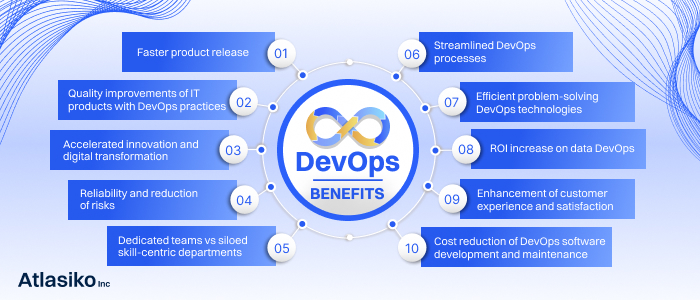Intro
Undoubtedly, the DevOps concept has become one of the most popular methodologies in modern software development practice. Seeking the most efficient ways of digital transformation, IT services companies adopt the DevOps model to automate software engineering operations, optimize time, costs, and quality of IT product development, and strengthen collaboration within their organizations and with clients. The implementation of this concept brings businesses facilitation of processes, an increase in productivity and revenue, better project organization, and many other benefits of DevOps.
Atlasiko Inc. incorporated DevOps in IT solution development a long time ago, so now we have excellent DevOps experience and expertise in setting up the DevOps process and using DevOps tools for our projects. Hence, as a result of software development services delivered by our programming company, you’ll get high-quality software and applications. In this article, we’ll explain DevOps and emphasize the advantages of DevOps utilization.

What is DevOps?
It’s logical to start looking into the pros of DevOps services utilization with a general DevOps definition. We’ve already determined the meaning of DevOps in previous articles, so let’s review this info briefly. First of all, we should mention that this term is an abbreviation of two words where Dev in DevOps stands for Development, and Ops full form is Operations. Let’s elaborate on the DevOps meaning to better understand DevOps concepts and the beneficial opportunities they can bring to businesses.
DevOps is a term used to describe a collection of practices, procedures, and philosophical approaches to the software development process where a DevOps team collaborates closely and aims to produce a quick-to-market solution. In contrast to the old paradigm, each DevOps software development team works together closely to share information, insights, and suggestions for improving the final product. A business develops the link between the development of IT goods and their delivery to customers and the market by establishing a DevOps environment. We’ve elaborated the DevOps definition so you can find out more details about the meaning of DevOps.
We apply the best DevOps practices to help you save costs and launch quickly.
Main DevOps benefits for businesses
DevOps value has increased dramatically in the span of recent years and the DevOps Trends Survey (2020) just proves this point showing that out of 500 DevOps managers and professionals almost 100% admit positive results for their businesses. Practical experience of other companies using DevOps also presents us with useful examples of DevOps influencing companies' progress. We studied statistics and practical experience to summarize the data, so let’s look closely at the core benefits of DevOps for the software development process and management.
- Faster product release
DevOps cycle of development is usually shorter than in traditional SDLC (software development life cycle) which means it can ensure fact and more frequent delivery of IT solutions to the market. Continuous integration and delivery are considered to be one of the best practices in DevOps for creating cycles of small incremental deliveries and feedback to achieve the goals of DevOps in the fastest way possible. In other words, businesses that choose to support DevOps perform application releases with increased cadences thanks to a shorter product delivery lifecycle and DevOps automation tools. Such batch sizes are also less influenced by risks because they’re easier to manage and secure. - Quality improvements of IT products with DevOps practices
The DevOps organization allows companies to better the quality of their IT solutions. All due to the practices and principles of DevOps such as continuous testing, deployment, and monitoring. DevOps tools for testing enable quick detection of bugs and other issues so the DevOps team can fix them. Other DevOps lifecycle phases also have mechanisms and DevOps methodologies to control and enhance the quality of software and applications. - Accelerated innovation and digital transformation thanks to DevOps automation
Automation in DevOps opens numerous ways for digital transformation in business and SDLC. DevOps toolchain takes care of all repetitive tasks employees would've had to do manually in a traditional model. Instead, with automated processes of DevOps testing and correcting codes, they have more resources and time to consider and incorporate innovations and digitalize manufacturing and business activities. - Reliability and reduction of risks
It is crucial for any business to create a comprehensive plan that emphasizes dependability, scalability, and enabling ongoing expansion. Teams can quickly deploy new software thanks to DevOps frameworks while maintaining the security of their on-premises data in a dispersed setting. The adaptability and dependability of IT solutions will enhance thanks to this agile DevOps methodology. DevOps practices and principles place a focus on managing a team's activities while preserving the integrity of the development environment. As a result, DevOps teams will be capable of continuously updating and modifying a product while still providing users with satisfying experiences. - Dedicated teams vs siloed skill-centric departments
When using a typical SDLC, you have to consult with your project managers at every step and request their approval before deploying anything. This traditional method takes a lot of time for development teams. DevOps workflows enable scheduling system deployments and deciding things at defined timelines. Departments that were once very isolated from one another can now communicate with one another quickly within the same corporation as this is the main goal of DevOps. A single DevOps team is able to work throughout the full DevOps software engineering cycle and maintenance procedures, perfecting their results, thanks to increased transparency and automation tools in DevOps, which are more efficient and less disrupting for the workgroups. - Streamlined DevOps processes of IT solutions development
DevOps pipeline tools support a DevOps operating model which allows team members to work more quickly by releasing small changes with higher frequency, spotting problems in almost real-time, and reacting promptly. DevOps best practices make a difference in the DevOps lifecycle from the traditional waterfall technique which is considered error-prone. Automated DevOps enables an organization to become its best self. This benefit of DevOps is more focused on streamlining the most crucial business procedures. - Efficient problem-solving DevOps technologies
DevOps principles are well-fitting and effective when it comes to reducing the negative consequences of production and deployment errors. Of course, it’s not right to say that the DevOps methodology enables avoiding them completely. However, it creates environments that help quickly fix issues and recover the DevOps framework in less time so failures won’t affect overall performance and efficiency. The DevOps cycle of software development is shorter so new versions of apps with useful changes are released more frequently. - ROI increase on data DevOps
Financial factor is an important advantage of DevOps. It enables firms to convert data quickly into cash. Recognizing the value of data can be made easier in a corporation with agile strategies of DevOps and automation. Using DevOps technologies and tools to automate DevOps Big Data, organizations end up saving time and resources. Expenses can be promptly recovered, and response times can be dramatically cut, increasing profitability. - Enhancement of customer experience and satisfaction
The ability to provide consumers or end users with high-quality services and IT solutions more quickly is almost the main DevOps goal in business. The most efficient approach to keep ahead of competitors is to focus the benefits of DevOps around good client experience and enhanced income. Many factors may contribute to agility and efficiency, but what really essential is improving client involvement. - Cost reduction of DevOps software development and maintenance
Initiatives focused on DevOps not only promote innovations that boost business value but also reduce project complexity and unexpected costs while saving money on maintenance and upgrades. It's arguable that a company can drastically reduce costs and boost profitability when it has a thorough DevOps strategy in place. One can benefit from scale efficiencies that are incorporated into manufacturing and testing workflows, particularly. DevOps not only makes it possible to deploy software more quickly but also uses fewer people, which lowers expenses. This frequently entails reducing the cost of change control procedures as well as some of the overhead connected with deployments.

Advantages of DevOps considered by different stakeholders
As we can see, the DevOps workflow organization has many advantages for business development in general as well as for software engineering and deployment processes. In the whole picture, nevertheless, all stakeholders aspire to fulfill collective goals, and each of them has their own commercial objectives that may vary. Undoubtedly, they view the benefits of DevOps differently depending on their interests and expected outcomes.
DevOps benefits for IT managers
The improvement of the operational and digital indicators is crucial for IT managers. Therefore, from the perspective of an IT manager, product performance criteria determine the benefits of DevOps. The advantages are the following:
- fewer faults overall
- reduced price of a release
- enhanced software functionality
- reduced investment costs
- a regular supply of updates, repairs, and innovative features
- enhanced recovery technologies
Favorable DevOps features for ChiefInformaton Officer
To ensure that the DevOps model is successfully implemented, the organization's CIO places a greater emphasis on strategic objectives integrating people-centric metrics. The following DevOps advantages are seen from the viewpoint of the CIO:
- personal development and cross-training
- increased resilience and agility
- opportunity to research and come up with ideas
- increase of team members' involvement
- strengthened collaboration between teams
- dependable and quicker solutions, as well as improvements in operational maintenance.
DevOps advantages for CEO
From the CEO’s point of view, the advantages of DevOps are controlled by business outcomes such as lower costs of production and higher profit. According to their company vision, here are some major benefits of DevOps adoption:
- higher standard and quality of products
- trustworthy relations with clients
- decreased production costs
- higher revenues
- IT infrastructure that is dependable and stable
- reduced interruption of development and deployment activities
- the company's productivity has increased
Benefits of DevOps certification for IT specialists
With the increase of use cases of DevOps for infrastructure and a bigger number of DevOps projects, the IT services market encourages specialists to get qualifications in the basics of DevOps. The more advanced skills they have, the more profit and career growth DevOps for developers will bring.
Various job opportunities
As more companies implement DevOps principles, they search for qualified candidates to fill open positions. It is even more important to utilize and study DevOps operations because of the discrepancy between the demand for and supply of necessary DevOps-skilled employees. This will guarantee increased employment prospects and rapid career advancement.
Advanced skills and knowledge
Understanding DevOps and cutting-edge techniques of decision-making processes has a lot of practical commercial and technical advantages that may be applied in businesses. DevOps experts can collaborate with IT specialists from different fields in cross-functional teams.
Better salary
The pay for DevOps work has increased dramatically as a result of the quick adoption of DevOps. One of the best-paid specialties in the IT sector is DevOps.

Even though some development projects might appear challenging, professionals of our team take it upon themselves to create an unparalleled solution. We develop programs keeping in mind business needs and goals of our clients.Talk to Expert
Challenges of DevOps implementation
Of course, whatever methodology you consider, it’ll have not only benefits but flaws, too. DevOps isn’t an exception. So let’s look at some possible DevOps disadvantages you may encounter while implementing DevOps in the software production process. Awareness of these aspects will help to avoid issues with DevOps management.
- Significant changes in the organizational aspect
According to Gartner, the majority of the advantages of DevOps might be neutralized because 75% of the principles and practices of DevOps will be difficult for businesses to adopt as a result of organizational learning and change barriers. However, with the right instruction and application, these problems can be solved. It is advisable to solve developing bottlenecks one at a time and avoid implementing DevOps all at once because too much modification at once might be troublesome. - Inadequate concentration on client needs
Greater obstacles frequently come from human-related aspects than from those that are directly tied to the DevOps technology stack. One of the objectives of DevOps is to increase team productivity, which is strongly related to the ability to automate various stages of the software development lifecycle provided by DevOps. Although customer needs must also be taken into account while implementing DevOps processes, customer value must serve as its foundation. Utilize DevOps' benefits to enhance the client experience. DevOps collaboration and continuous communication are essential for innovative solutions. - The interconnectedness within the DevOps infrastructure
It’s among the DevOps requirements that the teams working on the product's development must cooperate. The DevOps environment becomes more linked as a result. This implies that the DevOps groups share more than just data, mindset, and expertise; they also utilize the same tech means. Development, testing, staging, and production environments must all be set in the same way as a result. Unified infrastructure designs can assist the entire team in achieving the same objective in an integrated language.
Conclusion
After examining the DevOps meaning, the main objectives, advantages and disadvantages of DevOps, elements of the development process, and experiences, we can state without a shadow of a doubt why DevOps is significant. The benefits of DevOps include a decrease in the cost of creating, testing, writing, and deploying software as well as the ability to meet client requirements more quickly. Atlasiko Inc. would gladly assist you in adopting the techniques you choose that will enable you to provide value in the most creative and economical manner possible. Contact us to find out more about our high-quality IT consulting services.








Nice article! I wish there was some more statistics but good.
Hi! I appreciate your feedback. We have a few articles dedicated to the DevOps technology. You can find more stats in the article "What is DevOps?".